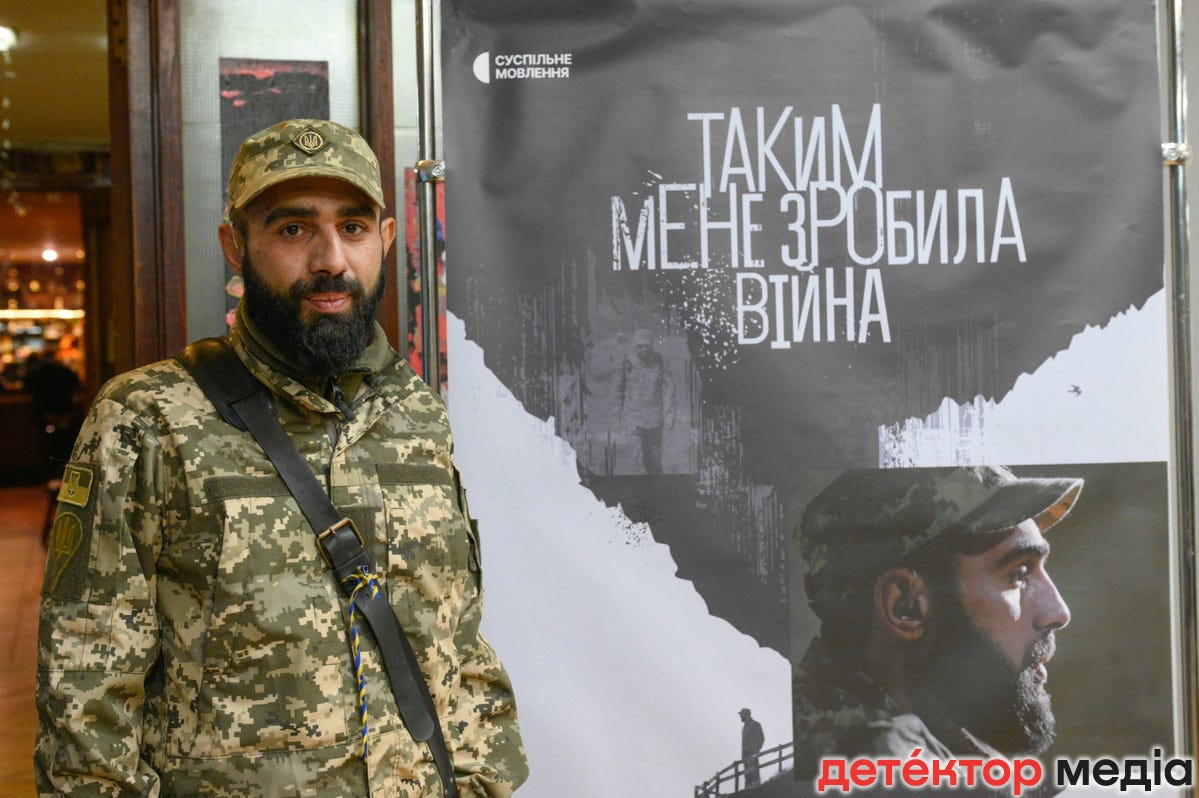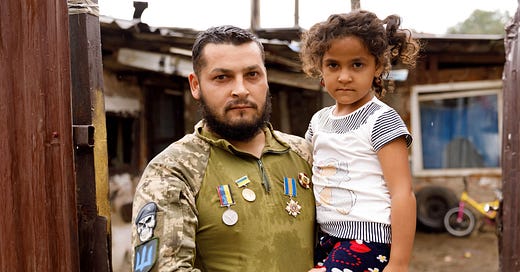russian colonialism 101: again never again.
What is happening in Ukraine today has happened many times before.
Russian Colonialism 101 is the first newsletter to shed light on Russian colonialism. The opening essay is public; the curated reading lists are behind a paywall. This newsletter is part of the Volya Hub network, which expands global awareness about Russian colonialism.
“The Russians weren’t paying attention to who was Roma or Ukrainian. They just killed everyone.” This is a quote from a recent newspaper profile of a Ukrainian-Roma Arsen Mednik, who defends Ukraine from the ongoing Russian invasion. It reminded me of one from a 2022 Western news report quoting another Ukrainian-Roma soldier, Viktor Ilchak (now the first highly decorated Ukrainian Roma veteran with an award for bravery): “On the front line, there is no nationality. Whether you’re Roma, Azeri, or Ukrainian, we’re all friends. Everything is collective. We consider each other brothers.”
Ukraine’s Roma population is approximately 400,000 - or roughly 1% of the country’s. However, according to recent polling, around a quarter of the Ukrainian Roma say they have family members fighting on the frontline — most as volunteers.
Why would one of the most discriminated minority groups in Ukraine be so eager to put their lives on the line for a free Ukraine and against Russian imperialism? I have a story for you that might explain it.
The Ukrainian resistance against fascism and colonialism, both its Western and Russian forms, dates back generations. The history of Ukrainian Roma fighting back against the colonial invaders, whether in 1945 or 2024, is integral to this story. However, it is also one of the least known. When I was putting together the Russian Colonialism 101 guidebook, I focused just on one aspect of Russian colonial expansion: invasions of states and peoples that managed to declare their sovereignty. But I was also shocked to learn the stories of so many nations that were colonized and/or wiped out by Russia before they even had a chance to exercise their self-determination rights guaranteed by international law. The story of the Romani nation is one of them.
This is that month of the year when you hear ‘never again’ all around Europe. Specifically, on May 16th, we mark the Romani Resistance Day. This is the annual anniversary of the 1944 uprising when over 6,000 Roma stood up to the Nazis in the Auschwitz-Birkenau genocide camp. They delayed the liquidation of the so-called ‘Gypsy camp’ by fighting off the soldiers sent to take them to the gas chambers. This story of the Romani defiance highlights still a little-known chapter of WW2 — the Porajmos or the Romani Holocaust, when Nazi Germany murdered up to 1.5 European Romani people or almost 2/3 of them. These are the stories we have only started learning at the mainstream level. The oppression of Roma under Russian colonial rule was no match to the Porajmos Genocide, but it is also barely researched or talked about.

As we mark the Romani Resistance Day and the Victory Day, I often think about my grandfather, who passed away over three decades ago.
He served with the Soviet Red Army in tank troops, helped to liberate Poland, and was among the Soviet troops entering Berlin in May 1945. For several years, together with other Ukrainians and Belarusians, he heroically charged ahead at Nazi Germans while Moscow military command was hiding behind their backs and intentionally using them as cannon fodder.
In one of the massive tank battles in western Ukraine, my grandpa’s tank gets hit. The command doesn’t care if he is dead or alive and leaves him behind to burn alive. Out of nowhere, Ukrainian resistance fighters from the UPA guerilla movement appear. At that time, they would fight both Russian and German colonial occupations. They take him in, help him recover, and nurture him back to life in a resistance camp. After several days they let him go to rejoin his Red Army unit and continue the advancement toward Berlin. It was a very daring decision considering the valid risk he would expose a Ukrainian rebel camp to his Moscow-controlled command and get them all murdered. But he didn't snitch on his fellow Ukrainians.
Why did they save him, though?
My grandad spoke Ukrainian, but he did not look like your average Ukrainian. He was Roma, with darker skin and all. The Roma living within the ever-changing borders of the Russian empire (during both the Tsarist and Red Fascism eras) faced all of the spectrum of Russian colonialism practices:
gaslighting by forced assimilation, Russification;
‘civilizing’ by cracking down on Romani nomadism and ordering Roma to live in state housing under strict movement surveillance;
erasing by banning the Romani language and culture, forcefully baptizing them into the Russian Orthodox Church, stealing Romani children, and sending them for ‘re-education’ in state orphanages.
The lasting legacy of the identity erasure that Roma suffered under Russian colonial rule is still self-evident. Roma people often remain the most marginalized group in former Russian colonies (here’s a must-read by prominent Ukrainian Roma voices Natali Tomenko and Volodomyr Yakovenko). Their marginalization only worsened in fascist Putinist Russia, and when Russians came to re-colonize southern Ukraine in 2022, Ukrainian Roma became one of the first to get targeted.
My grandad also faced lots of racism in his life and never knew his parents because he was one of those stolen by the state Roma kids. He never liked to talk about his roots. He never liked to talk, period. I can only imagine the hardships he went through because my dad and I carry lots of that same generational darkness in ourselves. But despite all of it, when Germany invaded, he put his life on the line to defend his village, his country, and his Ukraine. He was Ukrainian first, so there wasn't much of a dilemma there. I can only speculate, but I bet that's what those UPA rebels saw in him, too. Otherwise, why would they risk everything if not for saving a fellow Ukrainian? Even though that fellow Ukrainian would fight for Ukraine under a colonizer's flag.

Despite WW2 being central to Russian modern imperial mythology, Moscow would never amplify stories like my grandad’s. Because it conflicts with Russian mythology, which centers on the colonizer. That insists that Russians won WW2. That Russians liberated. That Russians are to be thankful for their sacrifices.
These resistance stories remind colonized people, like Ukrainians, that their strength and survival have always been in diversity and standing up for each other regardless of politics, ethnicity, language, or skin color. They remind us that we don't need colonizers to protect or defend us.
Back in 2022, a Romani-Ukrainian activist and artist, Natali Tomenko, told me this during our Ukrainian Spaces show: "My grandfather was also on the WW2 frontlines, and there were a lot of Roma who participated, but somehow it was hidden. Right now, my team ensures that we are a part of society - not in 50 years, but right now. We were, we are, and we will be. We stand shoulder to shoulder with Ukrainians because we live on this territory. We regard this territory as ours. So it's our land, and we protect it, no matter what. Roma have been living in Ukraine for hundreds of years and were repressed, but when an outsider approaches the family — no one is allowed to attack us. So that's why we're uniting now."
The main reason why today’s Romani Ukrainian fighters still face the same tough choices as my and Natali’s granddads did is because Russia wasn’t punished for any of its colonial crimes. Moreover, Moscow double-downs on false versions of history and guilt-tripping us how everyone should be grateful to Russians for ending WW2. Not only this erases the sacrifices of the people who paid the highest price for the WW2 victory - Ukrainians, including Ukrainian Roma. But also it doesn’t allow you to see that for at least half of Europe, WW2 did not end with liberation; it ended with one colonizer being replaced by another.
But whether in 1945 or 2024, the Roma resistance is stronger than any empire. Empires come and go, but Roma and Ukrainians stay. That’s why we have so many Roma fighters on the Ukrainian frontlines today. Maybe because the anti-colonial resistance that Ukraine is waging is very close to anyone who shares this double identity of a Romani and a Ukrainian person—something that makes this identity fully complete.
To educate yourself more about the resistance of the Roma people under Russian colonial rule and learn more about the beauty of the world, which is the Romani-Ukrainians, here’s your started pack:
Bury Me Standing: The Gypsies and Their Journey, by Isabel Fonseca
Pariah Syndrome: An Account of Gypsy Slavery and Persecution, by Ian Hancock
Arca, Ukraine’s leading hub for Roma youth. It focuses on elevating the voices of the Roma youth, supporting and preserving Roma history and culture, and building intercultural dialogue in Ukraine.
Tenet, a Ukrainian civil society initiative that centers the Ukrainian Roma voices and perspectives.
Roma For Europe, an EU-based foundation empowering Roma voices.

here is what's in store for you this week:
the colonial reality behind the ‘great Russian culture’ mythology: Tolstoy presented himself as a believer in equality and freedom abroad, but at home, he was a colonial landlord and a troubadour for Russian settler colonialism;
how Russia recycles Soviet propaganda to excuse colonial invasions;
how the colonial myth of Donbas helps Russia to excuse the ongoing colonial war in Ukraine;
how Russian culture enables Russian imperialism and colonialism;
curious for more? let's go.




